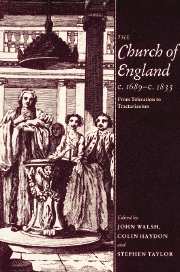Book contents
- Frontmatter
- Contents
- Preface
- List of Abbreviations
- 1 Introduction: The Church and Anglicanism in the ‘long’ eighteenth century
- Part I The pastoral work of the Church
- 2 The eighteenth-century Reformation: the pastoral task of Anglican clergy after 1689
- 3 The clergy in the diocese of London in the eighteenth century
- 4 The reception of Richard Podmore: Anglicanism in Saddleworth 1700–1830
- Part II Crisis and reform
- Part III Identities and perceptions
- Index
2 - The eighteenth-century Reformation: the pastoral task of Anglican clergy after 1689
Published online by Cambridge University Press: 13 October 2009
- Frontmatter
- Contents
- Preface
- List of Abbreviations
- 1 Introduction: The Church and Anglicanism in the ‘long’ eighteenth century
- Part I The pastoral work of the Church
- 2 The eighteenth-century Reformation: the pastoral task of Anglican clergy after 1689
- 3 The clergy in the diocese of London in the eighteenth century
- 4 The reception of Richard Podmore: Anglicanism in Saddleworth 1700–1830
- Part II Crisis and reform
- Part III Identities and perceptions
- Index
Summary
Recent historical scholarship has emphasized the pastoral initiatives developed by both Protestant and Catholic churches throughout Europe in the century after the Reformation. The fledgling Anglican Church has been shown to have participated in this preoccupation, in its concern for a more pastorally orientated clergy and in its attempt to inculcate Anglican doctrines and religious practices in the hearts and minds of parishioners. But in the period after 1660, what might be called the second century of the Church of England, the pastoral focus of the Anglican clergy has been seen in a far less favourable light. Whilst the pastoral endeavours displayed in the decades immediately after 1660 have begun to gain recognition, it is still commonly supposed that the initial post-Restoration energy and enthusiasm gave way to complacency and inertia after 1689 or 1714, only to be reasserted during the Evangelical and Tractarian Revivals. This essay explores some of the ways in which Anglican clergy in the century and a half between the Toleration Act of 1689 and the Tractarian movement saw their pastoral task and highlights some of the ways in which they hoped to implement it.
Some of the latest work on the functioning of the Church in this period, echoing older views, has tended to downplay the pastoral problems and concerns faced by Anglican clergy in the parishes.
- Type
- Chapter
- Information
- The Church of England c.1689–c.1833From Toleration to Tractarianism, pp. 67 - 85Publisher: Cambridge University PressPrint publication year: 1993
- 1
- Cited by



